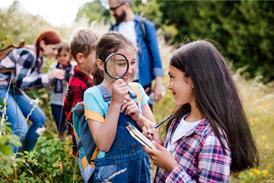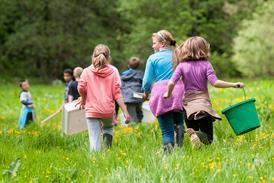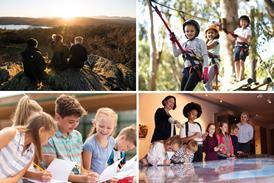When thinking about personal development and character education we must not be blind to the world outside the classroom walls, writes Elaine Skates, chief executive of the Council for Learning Outside the Classroom and STO columnist.

Everyone is talking about character education – and how to support the development of character traits likely to help pupils be successful at school, in later life and in employment.
With the new Ofsted framework including an emphasis on personal development and preparing students for ‘life and work in Britain today’, there is clear recognition from government that there is more to education than top grades in English and Maths at the end of Year 11.
Schools need to be so much more than exam factories. It is vital that we respond to the needs of employers and the challenges facing young people to ensure that their pupils develop the resilience and self-confidence to cope with the pace of change in the modern world. As Anne-Marie Duguid, Head of Teaching and Learning at SSAT says:
“We can’t prepare students fully for the reality of a world of work as we may have done 10, 20 or 30 years ago so we must prepare them to be ready for and happy with uncertainty, to be reflective and reflexive, to become autonomous self-regulated learners with a desire to learn for themselves.
“We can’t keep doing the same as we have been doing as our world is fast changing. There has never been a more important time to be aware that learning takes place everywhere and being able to construct your learning and apply it to a different context is key - learning inside and outside the classroom.”
With young people today growing up in the internet age, many are becoming entombed in their homes and classrooms: divorced from the natural environment, they don’t play outside as often nor explore as far as past generations. No wonder childhood mental health issues and obesity rates are soaring.
Added to this is the fact that many young people, particularly those from disadvantaged urban areas , do not get the opportunity to visit the natural environment and may not venture very far off their own estates at all.
Conversely, children from disadvantaged rural communities may not have visited their nearest city centre and have experienced rich cultural experiences such as theatres and museums. The sad fact is that for many children, if they don’t access these experiences through schools they won’t access them at all.
Proof of the benfits of learning outside the classroom
There is a wealth of evidence about the benefits of learning outside the classroom in helping pupils develop resilience, self-confidence, communication skills, creativity and the skills of inquiry and problem solving.
We often see that exposing pupils to new and novel ‘real world’ learning experiences on an educational visit can have much more impact than a day in the classroom in helping pupils develop self-confidence and social skills. It can also ensure pupils have a much broader experience base through which they can better understand people who come from a different social, cultural or religious background to their own.
The 2015 report by DEMOS, Learning by Doing, says that evidence suggests that character attributes not only reinforce academic learning but also have a significant positive influence on later life outcomes, including those relating to health, wellbeing and careers. The report goes onto say that participation in non-formal learning activities – semi structured activities such as sport, drama and debating, which are primarily delivered outside the classroom – play a vital role in developing these attributes.
However, it is important that schools don’t just see learning outside the classroom activities as being ‘extra curricula’ or about a fun day out once a year.
Ofsted’s view
Ofsted recognises that in order to be most effective LOtC activities should be well planned, integrated into the curriculum and evaluated for effectiveness: and many schools understand that taking this approach is the key to maximising the impact of the LOtC experiences that they offer.
95 schools have now achieved the LOtC Mark award, which is the first national accreditation that recognises and supports the development of LOtC across all subject areas.
One such school is Bay House School and Sixth Form, a large academy in Gosport that holds the LOtC Mark at Bronze level. Bay House offers learners a comprehensive programme of activities including a variety of day trips and overseas visits to places such as Malawi and China.
However the school, after analysing its data, realised that participation in LOtC was much lower for pupils on free school meals and has worked hard to ensure that its LOtC programme is more inclusive and affordable for all pupils.
During a two day programme of free learning outside the classroom within walking distance of the school involving the whole of year 7 (350 pupils), pupils developed their resilience during activities such as a hike, team building skills when participating in den building and knowledge of a local charity when visiting the lifeboat station.
One pupil commented:“The two days felt like a real adventure, we visited places where we had never been before and it was great to spend the time outside with my friends.”
Case study
Personal development/character outcomes can be further enhanced through the immersive learning experience unique to a residential programme. The Learning Away project has published a compelling case study about Child A, written by her teacher.
Child A is from a single parent background where she hasn’t experienced many of the things that most children take for granted. These include simple things like going to the beach, walking on sand or seeing country animals close up and being allowed to feed them. Things are hard for mum at home, although she tries her best and cares for her children deeply, she simply can’t afford to give her children these enriching life experiences.
Child A comes from a very deprived background and is the middle child of three children. Her older sibling has social behavioural issues and has difficulties mixing in school. Her younger brother has toileting issues, and this makes socialising difficult. She does not get as much attention from mum because her issues are not as obvious as those of her two brothers.
This attitude caused Child A to become withdrawn and isolated. She didn’t mix well and she wandered around on her own like a lost soul. It was a very miserable time in her life, you could see she had no self-confidence and she was a very sad little girl.
During a Learning Away residential experience, Child A developed immensely and “blossomed as an individual”. The challenges and new experiences she encountered enabled a usually insecure and reluctant child to shine in front of her peers for the first time and gave her a newfound platform from which to develop her self-esteem.
On her very first night, Child A told her class teacher: “I never want to go home! I feel so alive here.” The residential provided her with the opportunity to develop as a person and for her to reinvent herself in front of her peers. All of her teachers noticed that during the residential “Child A became the child all the others wanted on their team because they felt she was ‘good at everything’”.
Conclusion
All too often we are seeing in children from nursery through to secondary school that a limited experience base at home can impact negatively on personal development and, ultimately,academic attainment. Frequent, continuous and progressive learning outside the classroom is one of the most effective ways of improving later life outcomes for all pupils, especially disadvantaged pupils who may otherwise have very limited horizons.
I therefore urge all schools to consider doing more focused and effective learning outside the classroom to build character and ensure all pupils are properly equipped for real life and employment.
For more information about learning outside the classroom visit www.lotc.org.uk.









